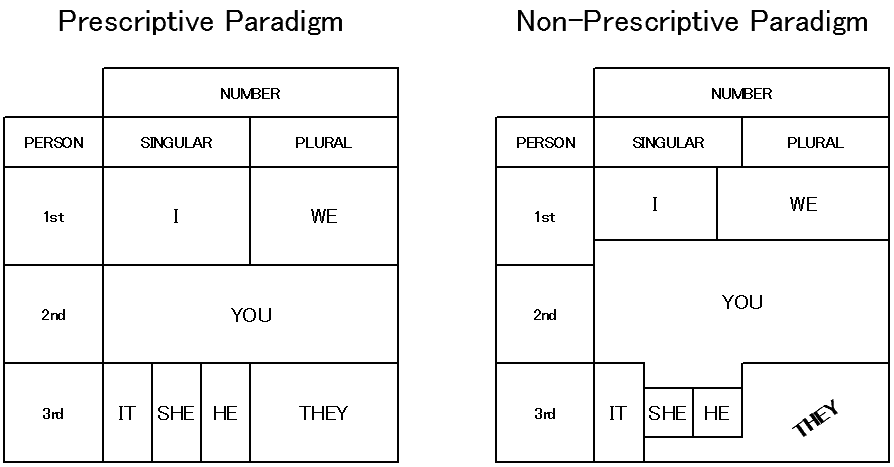伝統的に規範文法によって忌避されてきた singular they が,近年,市民権を得てきたことについて,「#275. 現代英語の三人称単数共性代名詞」 ([2010-01-27-1]),「#1054. singular they」 ([2012-03-16-1]),またその他 singular_they の記事で触れてきた.英語史的には,singular they の使用は近代以前から確認されており,18世紀の規範文法家によって非難されたものの,その影響の及ばない非標準的な変種や口語においては,現在に至るまで連綿と使用され続けてきた.要するに,非規範的な変種に関する限り,singular they を巡る状況は,この500年以上の間,何も変わっていないのである.この変化のない平穏な歴史の最後の200年ほどに,singular they を取り締まる規範文法が現われたが,ここ数十年の間にその介入の勢いがようやく弱まってきた,という歴史である.Bodine (131) 曰く,
. . . despite almost two centuries of vigorous attempts to analyze and regulate it out of existence, singular 'they' is alive and well. Its survival is all the more remarkable considering that the weight of virtually the entire educational and publishing establishment has been behind the attempt to eradicate it.
18世紀以降に話を絞ると,性を問わない単数の一般人称を既存のどの人称代名詞で表わすかという問題を巡って,(1) 新興の規範文法パラダイム (Prescriptive Paradigm) と,(2) 従来の非規範文法パラダイム (Non-Prescriptive Paradigm) とが対立してきた.Bodine (132) が,それぞれの人称代名詞のパラダイムを示しているので,再現しよう.

Non-Prescriptive Paradigm における YOU や WE の拡張は別の話題なのでおいておくとし,THEY が SHE, HE の領域に食い込んでいる部分が singular they の用法に相当する.比較すると,Prescriptive Paradigm の人工的な整然さがよくわかるだろう.後者のもつ問題点について,明日の記事で話題にする.
・ Bodine, Ann. "Androcentrism in Prescriptive Grammar: Singular 'they', Sex-Indefinite 'he,' and 'he or she'." Language in Society 4 (1975): 129--46.